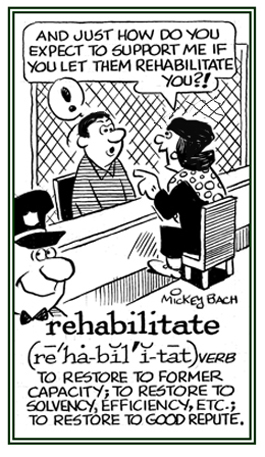habit-, hab-, -hibit; habili-, habil-
(Latin: to dwell, to live; have, hold; that which may be easily handled, is suitable, fit properly; clothing)
inhibitory (adjective)
1. That which restricts an action; either by a regulation or a strict discipline: "The teachers were compelled to impose specific inhibitory behaviors for students."
2. Tending to stop or to slow a process; such as, a neuron that suppresses the intensity of a nerve impulse.
2. Tending to stop or to slow a process; such as, a neuron that suppresses the intensity of a nerve impulse.
microhabitat
prohibit (verb), prohibits; prohibited; prohibiting
To refuse to permit something to be done or to forbid by law or by an order.
prohibition
prohibitionism
prohibitive
prohibitively
prohibitiveness
prohibitory
proton pump inhibitor, proton-pump inhibitor, PPI, gastric acid pump inhibitor
1. A drug that limits acid secretion in the stomach.
2. Any of a group of drugs that inhibit the activity of proton pumps and are used to restrain gastric acid secretion in the treatment of ulcers and gastroesophageal reflux disease.
3. Any of a group of drugs used to treat excessive secretion of acid in the stomach and any resulting ulcers.
2. Any of a group of drugs that inhibit the activity of proton pumps and are used to restrain gastric acid secretion in the treatment of ulcers and gastroesophageal reflux disease.
3. Any of a group of drugs used to treat excessive secretion of acid in the stomach and any resulting ulcers.
They block the enzyme (proton pump) in the cells of the gastric glands that secrete hydrochloric acid.
1. A condition in which the action of one group of a pair of antagonistic muscles is inhibited by the excitation of the other group: An example of reciprocal inhibition is when the biceps are prevented from contracting and bending the arm at the elbow, while the triceps are extending the arm, which is a result of reciprocal innervation.
2. The inhibition of an anxiety-provoking response by the practice of deep muscle relaxation: Reciprocal inhibition relates to behavior therapy in which the patient is exposed to anxiety-producing stimuli while in a controlled state of relaxation so that the anxiety response is gradually inhibited.
2. The inhibition of an anxiety-provoking response by the practice of deep muscle relaxation: Reciprocal inhibition relates to behavior therapy in which the patient is exposed to anxiety-producing stimuli while in a controlled state of relaxation so that the anxiety response is gradually inhibited.
reciprocal inhibition and desensitization (s) (noun), reciprocal inhibitions and desensitizations (pl)
In psychiatry, a form of behavior therapy in which the patient, while made to relax in comfortable surroundings, is gradually exposed to increasing amounts of anxiety-provoking stimuli: During reciprocal inhibition and desensitization, the patient can learn to tolerate these stimuli and may eventually learn to dissociate the anxiety from them.
rehab
rehabilitate (verb), rehabilitates; rehabilitated; rehabilitating
1. To return someone back to a normal, healthy condition after an illness, an injury, a drug problem, etc. by means of education or therapy: George was rehabilitated from being a former criminal to a respected worker at the local bank.

© ALL rights are reserved.
Go to this Word A Day Revisited Index
Glenda was rehabilitated to good health again as a result of medical treatments and therapies.
2. Etymology: from Latin re-, "again" + habilitare, "to make fit."
Go to this Word A Day Revisited Index
so you can see more of Mickey Bach's cartoons.
rehabilitation


